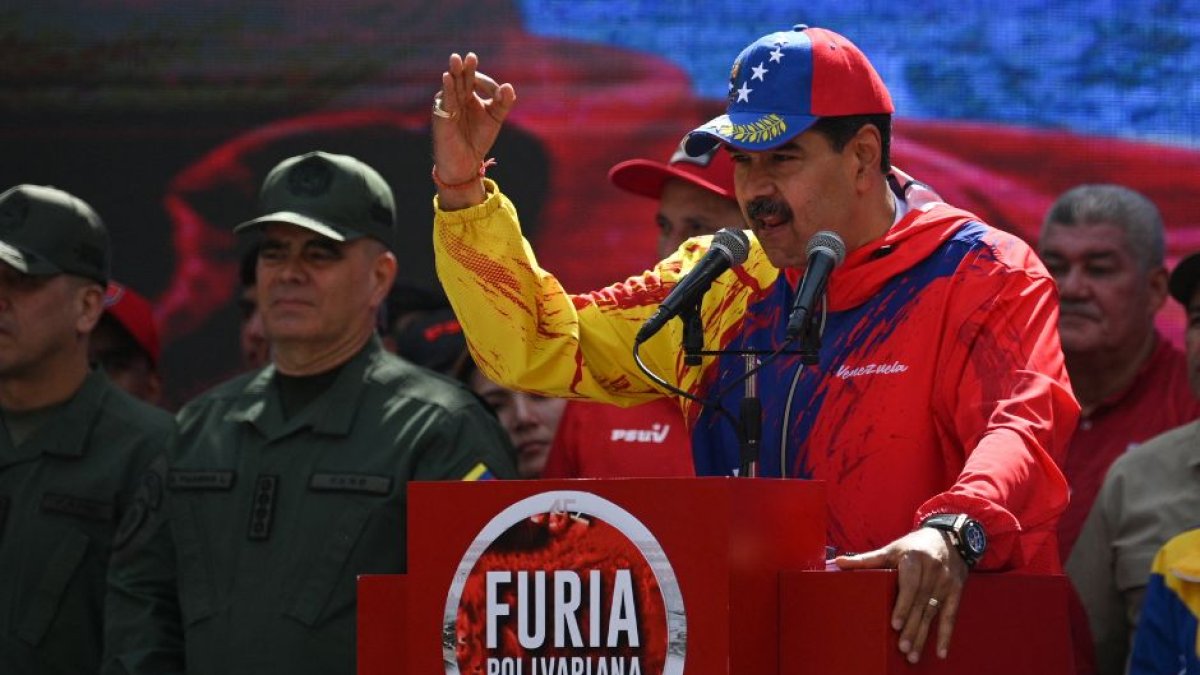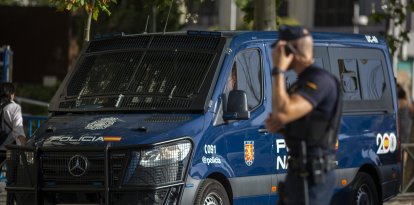Zero dissidence allowed: Chavismo presents a draconian 'anti-fascism law' to completely silence criticism inside and outside Venezuela
In the text, the Maduro regime defines “neoliberalism” and “moral conservatism” as characteristics of fascist ideology.

El dictador venezolano Nicolás Maduro. (AFP)
In the midst of an electoral campaign full of threats, persecution and arbitrary arrests, the regime of Nicolás Maduro, through its National Constituent Assembly of Venezuela, presented a new bill to criminalize political dissent and completely limit freedom of expression on social networks and the media in Venezuela.
Called the “Bill against Fascism, Neofascism and Similar Expressions,” the new mechanism of repression of the Chavista dictatorship is ironically sold as an “anti-fascist law” which, according to its own wording, serves as a legal framework to justify abuses against critics of the Maduro regime.
Venezuelan Vice President Delcy Rodríguez, in charge of presenting the bill, justified the text by saying that its prompt enactment was a way to protect Venezuelans from the opposition “with fascist characteristics.”
Rodríguez, a senior official of the regime, recalled that in 2014 and 2017, Venezuelans took to the streets en masse, and, in her words, there were fatalities and injuries that were the responsibility of the opposition “extremist sectors” who ultimately “asked” for a “criminal blockade” with the aim of having an “economic and social genocide” in Venezuela.
In her speech, Rodríguez pointed out that the political opposition in Venezuela “openly ignored the institutions” and that it was time to protect Venezuelans from these supposed fascist sectors that seek to destabilize the country.
Specifically, she compared the opposition leader María Corina Machado, persecuted and politically disqualified by Chavismo, with Hitler, saying that her electoral motto “until the end” was the call for the “final battle” of the Nazi tyrant.
“We have passed these stages of ‘La Salida’ in 2014, the protests in 2017, and today, the extremist sector has been summoned ‘until the end.’ I want to remember that Hitler called for the final battle and exterminated millions of men and women on the European continent, and today, history repeats itself. We must ask ourselves what they are referring to when they speak until the end because once again, there is the virus of violence, hatred, and extermination,” said Rodríguez, clearly referring to Machado.
Machado’s political party, Vente Venezuela, has been suffering constant attacks from the Maduro regime for months. Various members of the party, especially from within Machado’s closest circle, were arrested or charged by the Chavista Public Ministry on charges such as “conspiracy,” “incitement to hatred,” or even “assassination.”
A law that places “moral conservatism” next to fascism
The spirit of the law is clear. When it is enacted, messages and the existence of organizations that are considered “fascist” by Chavismo will be prohibited in Venezuela.
Organizations include political parties, think tanks, and organizations critical of the Maduro regime.
In total, the Chavista vice president said that the law consists of four chapters and 30 articles, emphasizing article 4, where dissent is notoriously criminalized by linking “liberal” or “conservative” ideals with fascism.
The article establishes a definition of what “fascism” means according to Venezuelan law. The section mentions “neoliberalism” and “conservatism” as essential characteristics of fascism.
“Fascism: Ideological position or expression based on reasons of racial superiority, ethnic, social or national origin, which assumes violence as a method of political action, promotes the culture of death, denigrates democracy, its institutions and republican values and /or promotes the suppression of the rights and guarantees recognized in the Constitution in favor of certain sectors of society, for discriminatory reasons. Common features of this position are racism, chauvinism, classism, moral conservatism, neoliberalism, misogyny and all types of phobia against human beings and their right to non-discrimination and diversity,” the bill reads.
“Bill against the ... by emmanuel.rondon
Some Venezuelan analysts consider that this section outlaws the political opposition that positions itself ideologically to the right of Chavismo, however, others think that it outlaws all dissent in general.
“Not only the right, this law provides the legal framework to prohibit all dissent against Chavismo,” Daniel Chang, a Venezuelan political analyst based in the United States, told Voz Media. “It will not only persecute liberals and conservatives, but any “person who opposes the regime.”
In that sense, the text of the law threatens political disqualification and prison sentences against people who supposedly promote fascism within Venezuela.
“Any person who defends or promotes the principles, facts and methods of fascism, neo-fascism and similar expressions will be punished with imprisonment of six to ten years and political disqualification for the duration of the sentence,” the document reads.
Likewise, the law also establishes that the same penalty will be imposed on any person who “promotes the constitution of organizations that exalt, advocate or are based on fascism, neo-fascism and similar expressions” and “convenes or organizes public meetings or demonstrations with the object of promoting or apologizing for fascism, neo-fascism and similar expressions.”
Social networks will no longer be a safe space in Venezuela
Chavismo seeks, according to the text, to control not only physical public spaces but also social networks.
That is why Rodríguez warned that the content published on the Internet is addressed in the bill.
The vice president mentioned that “Facebook’s algorithms favor negative messages over positive ones” and that the anti-fascist law seeks to eliminate “any form of expression, ideological political conception or any type of violent action” within Venezuela.
Analyst Daniel Chang left no room for doubt when asked whether Chavismo will increase the repression of critics on networks.
“Sadly, yes. Chavismo detects a threat in the citizen movement formed by the candidacy of María Corina Machado, whom they had underestimated. Since the usual tactics have not worked for them (co-opt and divide), Chavismo is increasingly using its most primitive weapon: brute force,” Chang told Voz Media.
In addition, the document directly threatens Venezuelan television and radio stations with fines and even “the revocation of license” for transmitting fascist messages.
The “anti-fascist” law also establishes fines for disseminating “prohibited messages” in print and digital media. Likewise, all media in general—newspapers, television and radio stations—must guarantee that their spaces are “free of messages of a fascist nature.”
The right to protest openly repressed
Specifically, the “law” gives special powers to the Public Ministry to apply discretionary measures to interrupt activities that promote or advocate fascism or similar expressions.
With this law, Chavismo could, for example, interrupt demonstrations organized on social networks or the press because it considers them related to fascist ideology.
Walter Molina, Venezuelan political scientist and writer, told Voz Media that, in essence, the “law” is designed not only to eradicate dissent but also the common citizen who may be critical of Chavismo.
“This text has as its main objective the dissident, but it is still dangerous for any citizen in Venezuela. We are talking about a country where nine out of ten people want and need change, and Chavismo knows it,” Molina said. “This ‘Law against fascism’ (very fascist, by the way) seeks to frighten any citizen who wishes to express themselves against the regime. That is why it comes after well-thought-out arbitrary arrests: Rocío San Miguel (human rights defender), Víctor Venegas (teacher and trade unionist), political leaders of Vente Venezuela and even a YouTuber. In Venezuela, there is state terrorism.”
Among those persecuted by Chavismo in recent weeks is the journalist and editor of Voz Media, Orlando Avendaño, a renowned critic of Chavismo who was groundlessly accused of “inciting hatred” and conspiring to destabilize the country from abroad.
Avendaño, who also has Colombian nationality, is proof that Chavismo also seeks to control discourse on social networks outside of Venezuela, seeking to silence criticism not only within the country but also outside.
In that sense, Molina says that the “Law against Fascism” is a continuation of other previous projects enacted “to violate human rights for political reasons, such as the ‘Law against Hate.’”
For this reason, Molina believes that persecution against journalists and ordinary citizens will deepen in public spaces and on social networks in a year relevant to the country’s future.
“A regime like Chavismo only has fear and repression left, and they are not going to stop using it. That is why this year is so important for the immediate future of the country because we are going to define if we will begin a transition to democracy or if we will begin to see a totalitarian State,” Molina stated.

























